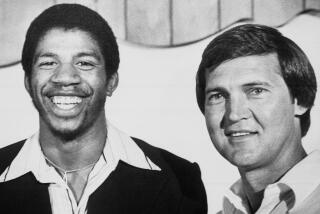Taking the Magic Out of a Campaign
- Share via
It’s true that educating the young on the kinds of behavior that might put them at risk of AIDS can be emotionally difficult for older people. But it remains crucial that this potentially lifesaving information be made available, especially to teen-agers.
A public information campaign on AIDS is probably the most effective way to reach large numbers of youths. Absent that, AIDS information can get out through private efforts including books and magazines.
One example of a private effort is the new book of Earvin (Magic) Johnson, a member of the U.S. Olympic basketball “Dream Team” and a former Los Angeles Laker. Johnson, who has the HIV virus, is promoting “What You Can Do to Avoid AIDS,” which has won widespread praise from esteemed authorities such as the American Medical Assn., the Children’s Defense Fund and the American Foundation for AIDS Research.
The basketball star, ostensibly the book’s author, actually didn’t write this paperback. However, he assisted in its preparation and endorses its content. The book recommends abstention, describes specific behavior that puts people at risk, uses slang for some anatomical terms (after all, the book is aimed at teen-agers) and lists helpful groups.
Despite its strengths, the book has already run into problems. Three of the nation’s largest chains--Kmart, Wal-Mart and Walgreen--have decided not to stock it. One pulled the book because it was “not in keeping with what our customers tell us they want to read.” Another said the book violated the chain’s longstanding “clean magazine” policy, which bars magazines such as Penthouse and Playboy.
Oh, boy. Miscasting Johnson’s book as some sort of sleazy production considerably narrows the scope of its educative values. The retailers should reconsider their decision to ban a book that might actually help curb the epidemic and save lives.
More to Read
Sign up for our Book Club newsletter
Get the latest news, events and more from the Los Angeles Times Book Club, and help us get L.A. reading and talking.
You may occasionally receive promotional content from the Los Angeles Times.








